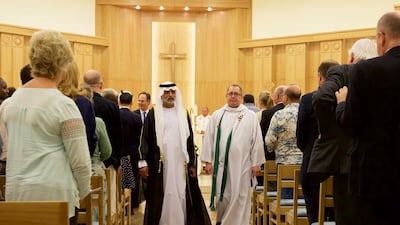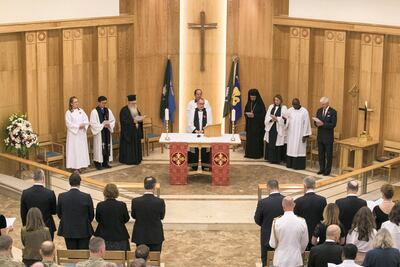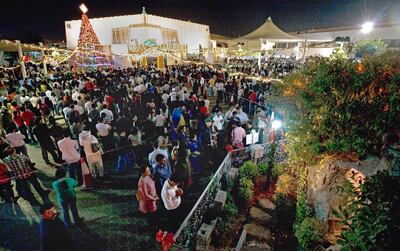It never ceases to amaze me that the most influential religious movements of human history emerged from a small strip of the Middle East. Out of the deserts and wilderness of Arabia, Moses, Jesus and the Prophet Mohammed left legacies that still directly impact the lives of more than 55 per cent of the global population today.
Historically, the teachings of Judaism, Christianity and Islam have been at the centre of some of the largest and most enduring empires the world has ever seen. These Abrahamic religions have inspired the formation of not only countless synagogues, churches and mosques, but also myriad schools, universities, hospitals, NGOs and political institutions that shape national agendas.
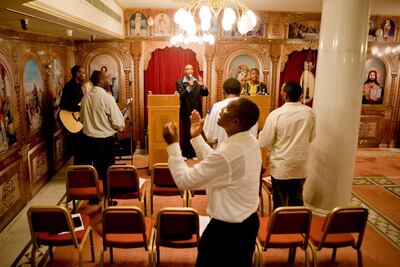
The tragedy is that, despite the shared convictions of each faith community – that there is one God who created the heavens and the earth, that all humans are created in the image of God, and that God reveals his message in history through prophets and scriptures – we frequently lapse into damaging bouts of intolerance. Religion consequently suffers from a bad reputation and at the heart of it is the practice of "othering". This is a mindset misinformed by a theology that creates the idea of “us’’ and “them”. In the name of God, believers wrongly persecute and kill because their ideology somehow diminishes and dehumanises the other.
Today the practice of "othering" is a massive global trend. It is this mindset that lies behind populist movements in the world today. "Othering" is manifested in the ideology of ISIS, the desire to build walls and in bitterly divided communities found on every continent. Yet I have hope.
It was Hans Kung, the Swiss Catholic theologian, who observed that there can never be peace between the nations unless there is peace between the religions. Therein lies our hope and our challenge as religious communities. It is the hope that our beliefs contain the key to creating peace in our world – that in the teachings of our faith lies the antidote to intolerance.
I have lived in the UAE for a number of years and, through studying Islam, discovered that Jesus was important to Muslims as the prophet Isa. I also saw Emirati culture reflected in the world of the Bible. This led me to write Jesus of Arabia, a journey that would help me discover a Jesus who confronted "othering" in a Middle Eastern context.
I want Christians to understand that Jesus celebrated a way of life and a culture of hospitality that resonated deeply with Arab Muslims – because his culture was their culture. However, the teachings of Jesus were deeply provocative because he was challenging his own Middle Eastern roots.
For example, the Bible teaches us that a religious scholar came to Jesus and asked him what the most important thing was that a believer could do to please God. Jesus’s response was: "Love God and love your neighbour." Not satisfied with this, the scholar demanded a definition of the word neighbour. In reply, Jesus told the story of the Good Samaritan, who stopped to help a man who had been badly beaten by robbers and left for dead. The Samaritan, a foreigner and of a different faith to the victim, was the embodiment of the other. But he was also the good neighbour when others of the same faith had walked on by without stopping.
The Jesus of Arabia I discovered in my research for the book taught us that what pleases God most is worship resulting in compassion and love that transcends cultural, religious and national boundaries. The worship of God should inspire us to reach out to the other by building bridges, not walls, by providing for refugees and by caring for the marginalised and the poor. This should be the real fruit of faith.
_______________
Read more:
Where to attend Christmas Mass in Abu Dhabi, Dubai and the rest of the UAE
Crown Prince of Abu Dhabi wishes Christians across the world peace and happiness
Queen's Christmas speech: British monarch to say peace needed as much as ever
_______________
Jesus of Arabia modelled this over and over again. He gave dignity to broken and "fallen" women, who were the most vulnerable members of society. He touched people who carried contagious diseases; he saw individuals in the crowd and gave them attention; he confronted structures which were devoid of love.
Further, Jesus talked to people rather than at people. He asked questions, participated in dialogue and taught with stories. He fully entered into the experience of the people around him, an approach which Christian theologians describe as "incarnational’". He immersed himself in the language and culture of his world and only then did he begin his ministry.
I find similar values in Islam, as Sheikh Nahyan bin Mubarak, the UAE’s Minister of Tolerance, reminds us. There is a divine mandate to know one another and, in the process of doing so, find mutual understanding and respect or, in other words, tolerance and acceptance.
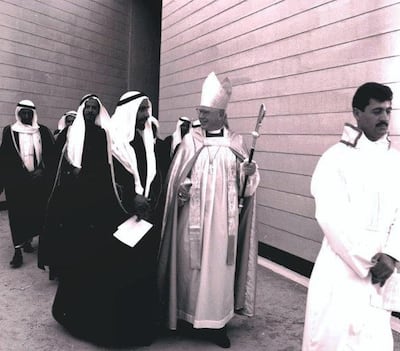
Emiratis have offered hospitality to millions of people in their nation. They have offered land to religious "others". They have helped build churches and temples, allowed freedom of worship and invited people of other faiths to participate in dialogue that seeks to promote coexistence and respect. Tolerance then, is the value through which the UAE is moving the conversation from "us'" and "them", to "we". The visit of the Pope to the UAE next year is a massive step. It signifies a declaration to the world that tolerance and understanding are what define the UAE as a nation.
This Christmas, as thousands of Christians gather in the UAE to celebrate the birth of Jesus, we recall that this baby was destined to live a life in which he confronted the practice of "othering". Jesus regularly confronted members of his own faith and his own followers for being legalistic and judgemental about others. Christians believe his life and death were a clarion call to those who follow him that they too must confront intolerance.
As people of all faiths in the UAE look forward to the Year of Tolerance, I pray that Jesus of Arabia will be a source of inspiration and hope to many as we share the UAE's commitment to creating a society of respect and peace.
The Reverend Canon Andrew Thompson is the chaplain of St Andrew’s Anglican Church in Abu Dhabi and the author of 'Jesus of Arabia', which is available in English and Arabic.
